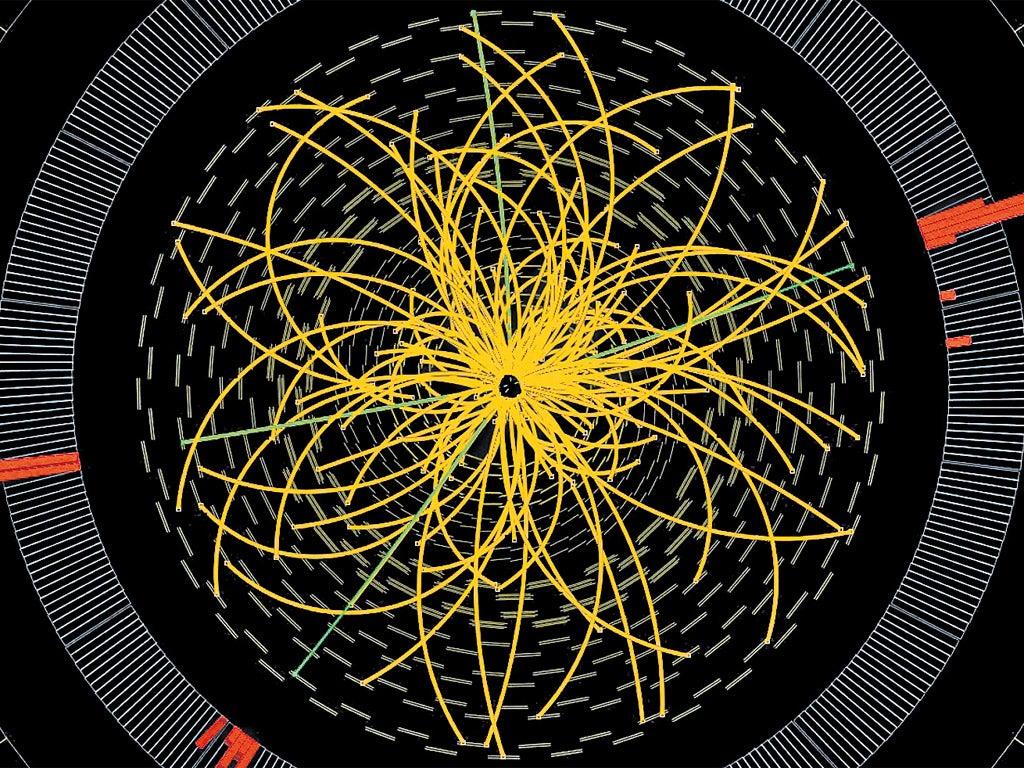Scientist backs discovery of Higgs boson 'God particle'

The scientist who heads the world's largest particle physics laboratory said he thinks it is “beyond any doubt” that a Higgs boson particle has been discovered.
Professor Rolf Heuer, director general of Cern, the European Organisation for Nuclear Research, said he would "stick his neck out" and say it had been found by scientists.
He was speaking during a visit to Edinburgh where he met Professor Peter Higgs, the man who gave his name to the particle.
Prof Heuer was delivering a lecture to students, academics and members of the public at Heriot-Watt University.
He discussed the announcement made in July that teams at the Large Hadron Collider (LHC), the £2.6 billion "Big Bang" atom-smasher near Geneva, Switzerland, had found a new particle "consistent" with the Higgs boson.
The results were preliminary and more work is being done before scientists can be sure about what they have captured.
Of the discovery, he said: "We have set a certain limit which the data significance has to exceed in order to call it a discovery.
"That limit we have reached on July 4, so I was very happy to state I think we have it, and I think we have it still.
"When they finalised the data, the significance has even increased, so this is why I stick my neck out and say I think it is beyond any doubt because it looks very, very clear and very well in hand, so I think we have found this new particle."
Prof Higgs, 83, the retired British physicist from Edinburgh University, hit on the concept of the Higgs mechanism in 1964 while walking in the Cairngorms.
The Higgs boson gives matter mass and holds the physical fabric of the universe together.
Observations so far show the discovery looks and acts like the long-sought particle that has eluded them for 50 years.
Speaking before the lecture, Prof Higgs said: "The seminar on July 4 was an overwhelming experience for me, the end of a long road.
"Since then I have had an immense number of letters and emails, I get stopped in the street and asked for my autograph. It's been getting more and more hectic.
"As far as the discovery is concerned, clearly at the moment the next few months are going to be a consolidation period, where more and more detail is found about this object, but eventually I expect there to be much more interesting things discovered in the LHC which take us beyond this rather neat model which we call the standard model, and that will be the really exciting part."
In July, scientists confirmed that two of the LHC's giant detectors, CMS and Atlas, had delivered results achieving the definitive "five sigma" level of proof.
A sigma is a measure of how likely it is that a finding is down to chance. At five sigma, the likelihood of a statistical fluke is one in a million.
Prof Heuer added: "What I call the Higgs boson is, in our terminology, the boson of the Standard Model of particle physics which requires only one boson.
"However, this one boson has clear properties and so we have to measure these properties.
"It will be very interesting if we don't have one boson but a family of Higgs bosons because that would indicate physics beyond the Standard Model.
"The Standard Model just describes around 4-5% of our universe, 95% is still unknown to us and if we find more than one or if we find a deviation from the properties as expected for the standard model then that would be a huge jump forward from 5% to much more. This is what excites us at the moment."
PA
Join our commenting forum
Join thought-provoking conversations, follow other Independent readers and see their replies
Comments
Bookmark popover
Removed from bookmarks